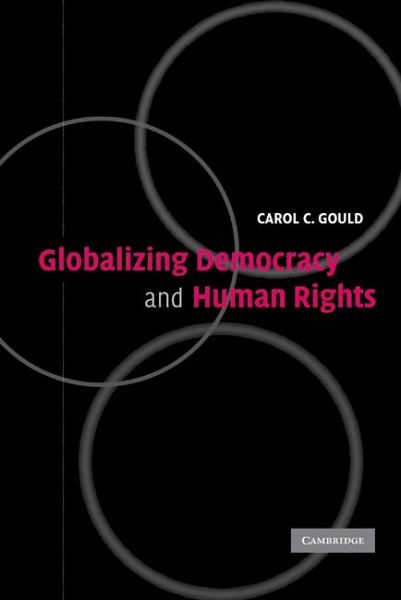
Globalizing Democracy and Human Rights

PAYBACK Punkte
41 °P sammeln!
In this book Carol Gould addresses the fundamental issue of democratizing globalization.In her new book Carol Gould addresses the fundamental issue of democratizing globalization, that is to say of finding ways to open transnational institutions and communities to democratic participation by those widely affected by their decisions. The book develops a framework for expanding participation in crossborder decisions, arguing for a broader understanding of human rights and introducing a new role for the ideas of care and solidarity at a distance. Reinterpreting the idea of universality to accommo...
In this book Carol Gould addresses the fundamental issue of democratizing globalization.
In her new book Carol Gould addresses the fundamental issue of democratizing globalization, that is to say of finding ways to open transnational institutions and communities to democratic participation by those widely affected by their decisions. The book develops a framework for expanding participation in crossborder decisions, arguing for a broader understanding of human rights and introducing a new role for the ideas of care and solidarity at a distance. Reinterpreting the idea of universality to accommodate a multiplicity of cultural perspectives, the author takes up a number of applied issues, including the persistence of racism, cultural rights, women's human rights, the democratic management of firms, the use of the Internet to enhance political participation, and the importance of empathy and genuine democracy in understanding terrorism and responding to it. Accessibly written with a minimum of technical jargon this is a major new contribution to political philosophy.
Table of content:
Acknowledgements; Introduction: between the personal and the global; Part I. Theoretical Considerations: 1. Hard questions in democratic theory: when justice and democracy conflict; 2. Two concepts of universality and the problem of cultural relativism; Part II. Democracy and Rights, Personalized and Pluralized: 3. Embodied politics; 4. Racism and democracy; 5. Cultural identity, group rights, and social ontology; 6. Conceptualizing women's human rights; Part III. Globalizing Democracy in a Human Rights Framework: 7. Evaluating the claims for a global democracy; 8. Are democracy and human rights compatible in the context of globalization? 9. The global democratic deficit and economic human rights; Part IV. Current Applications: 10. Democratic management and the stakeholder idea; 11. Democratic networks: technological and political; 12. Terrorism, empathy, and democracy; Index.
In her new book Carol Gould addresses the fundamental issue of democratizing globalization, that is to say of finding ways to open transnational institutions and communities to democratic participation by those widely affected by their decisions. The book develops a framework for expanding participation in crossborder decisions, arguing for a broader understanding of human rights and introducing a new role for the ideas of care and solidarity at a distance. Reinterpreting the idea of universality to accommodate a multiplicity of cultural perspectives, the author takes up a number of applied issues, including the persistence of racism, cultural rights, women's human rights, the democratic management of firms, the use of the Internet to enhance political participation, and the importance of empathy and genuine democracy in understanding terrorism and responding to it. Accessibly written with a minimum of technical jargon this is a major new contribution to political philosophy.
Table of content:
Acknowledgements; Introduction: between the personal and the global; Part I. Theoretical Considerations: 1. Hard questions in democratic theory: when justice and democracy conflict; 2. Two concepts of universality and the problem of cultural relativism; Part II. Democracy and Rights, Personalized and Pluralized: 3. Embodied politics; 4. Racism and democracy; 5. Cultural identity, group rights, and social ontology; 6. Conceptualizing women's human rights; Part III. Globalizing Democracy in a Human Rights Framework: 7. Evaluating the claims for a global democracy; 8. Are democracy and human rights compatible in the context of globalization? 9. The global democratic deficit and economic human rights; Part IV. Current Applications: 10. Democratic management and the stakeholder idea; 11. Democratic networks: technological and political; 12. Terrorism, empathy, and democracy; Index.














